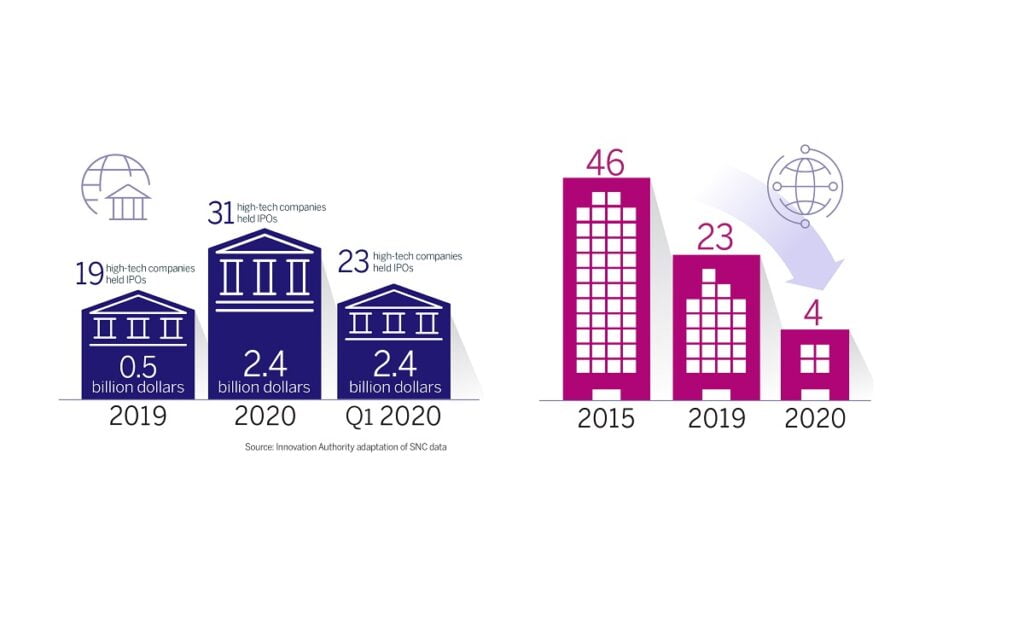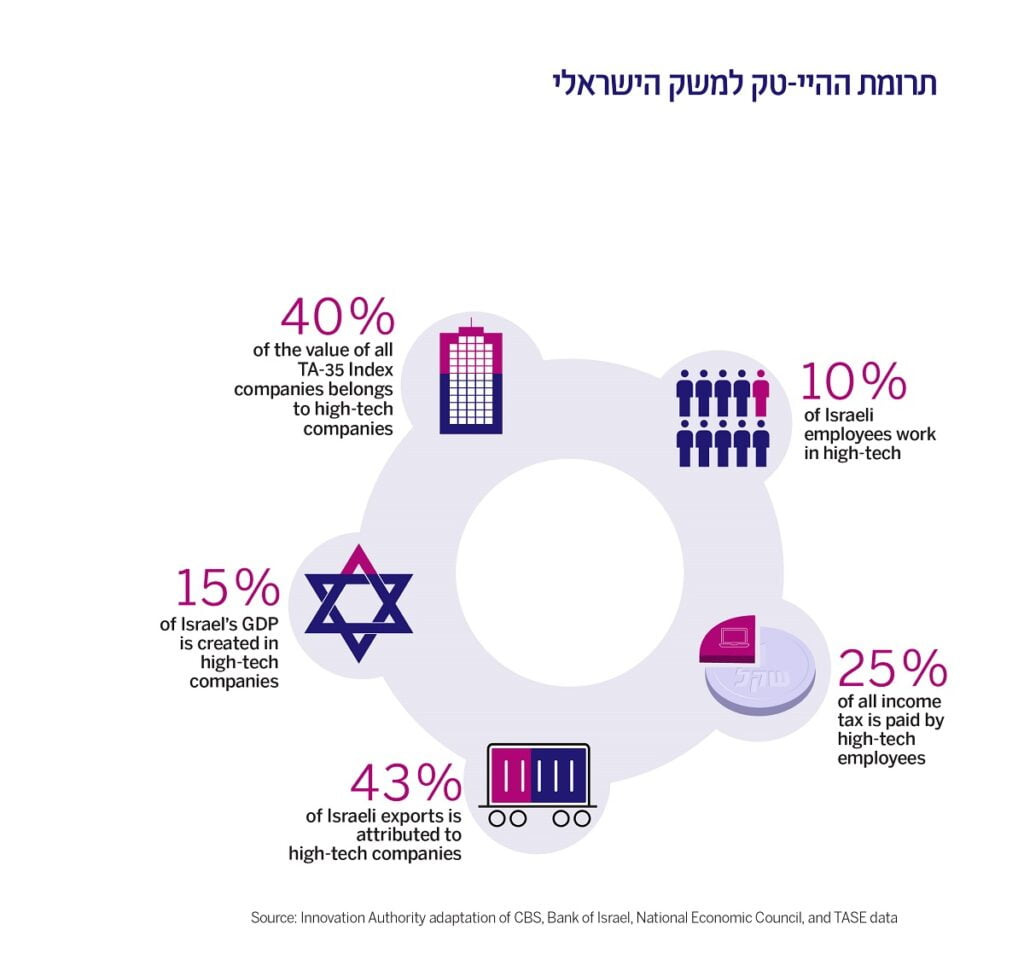In a year marked by an unprecedented crisis, the Israeli high-tech industry flourished with the acceleration of digital tech trends, even as the country faced numerous social, economic, and health challenges. A new report by the Israel Innovation Authority (IIA) released on Wednesday says the high-tech industry can and should continue to contribute to the recovery and rehabilitation of the local economy as it has through the pandemic year.
Sagi Dagan, VP and head of the Israel Innovation Authority’s Growth & Strategy Division, says one of the key points tackled in the report is “how is the Israeli government — in this case the new government — going to leverage the success and the opportunity [of the Israeli high-tech sector] in order to create a massive impact on the Israeli economy and the productivity of the labor market.”

Some ten percent of Israeli employees who work in the high-tech sector are responsible for 15 percent of Israel’s gross domestic product (GDP), 25 percent of the total income tax paid in Israel, 43 percent of exports, and 40 percent of the value of companies listed on the Tel Aviv 35 Index, the report shows.
“If the government does not reassess its policies toward the sector, high-tech growth will benefit the high-tech sector alone,” the Israel Innovation Authority said in a statement.
The influence of high-tech on the resilience of the Israeli economy “requires the country to ensure the continued prosperity of the high-tech sector,” said Dr. Ami Applebaum, chairman of the Israel Innovation Authority, in the statement. “At present, the number of new startups founded each year is sharply declining, the number of seed-level investment rounds is diminishing, and governmental research and development budgets are being cut on an annual basis – dramatically, relative to other countries.”
The report notes that 1,404 startups were established in 2014, while just 520 were created in 2020. In 2016, 46 new multinational development centers were established in Israel compared to just four in 2020.
“We are not extremely worried, but we don’t want to find ourselves in 10 years from now saying, ‘oh, we should have invested in more startups because we don’t have enough companies,'” Dagan tells NoCamels. “It’s a very complex issue because there are a lot of reasons this is happening. It’s a global decline in startups, but it’s also because more companies are growing and less are closing.”

“We see it as the market is maturing,” he adds. “This is one of the reasons that we maybe have to change the way that we support high-tech companies or the kind of support that we provide, in order to adjust to the market. So that we can see more startups coming in the future.”
Other challenges in the Israeli tech sector are also detailed at length in the report including the decline in the number of seed investments in the last two years, the need for more advanced government regulation, and the decline of government investment in applied research.
The report also notes the ongoing shortage of human capital in the local tech sector. The shortage dropped significantly in 2020, with an estimated 13,000 open tech positions since late 2020 (down from 18,500 in the previous year) but remains high. Some 60 percent of companies reported difficulties recruiting employees for R&D roles, according to a joint Start-Up Nation Central (SNC) and the Israel Innovation Authority (IIA) earlier this year.
But while the shortage of experienced employees is ongoing, the new IIA report also noted that the number of “junior,” or entry-level employees is not rising.
“One in four students in Israel is studying for a bachelor’s degree in a technological field. While this is, on the one hand, good news for a sector with a chronic human capital shortage, the influx of new graduates may exacerbate the inability of inexperienced entry-level candidates to find a job in the high-tech sector,” the IIA statement said.
Sign up for our free weekly newsletter
SubscribeA positive outlook
While the Israel Innovation Authority warns of concerning trends in the industry, much of the report ” is extremely positive and optimistic,” with parts “showing opportunities that have occurred in the last year which are opportunities for the new government and the private sector to step up,” Dagan tells NoCamels.
The capital raised by Israeli startups has more than quadrupled over the past decade, and in 2020 totaled $11.5 billion, which is 20 percent more than the amount of capital raised in 2019. The average size of an investment round increased by 10 percent compared to 2019, with the bulk of this growth in funds raised by later-stage start-ups, some of which raised unprecedentedly large rounds totaling hundreds of millions of dollars, the report shows.
Despite the worrying trend of fewer seed-level investments, the capital raised by Israeli startups in their mature stages is increasing sharply, with more than 20 investments of over $100 million in the first quarter of 2021 alone.
According to the report, high-tech exports are growing steadily. In 2020 they totaled almost $50 billion, which is over 40 percent of the total value of Israeli exports.

In one of the most significant trends that came out of the past year, the number of Israeli startups going public reached an all-time high in 2020. There were 31 IPOs (initial public offerings) of Israeli companies, mainly on the Tel Aviv and US stock exchanges. This figure is double the number in 2019.
“The IPO trend is expected to continue, with more Israeli companies in the pipeline preparing to list and raise capital on stock exchanges. This trend is an indicator of the level of maturity achieved by the high-tech sector. An increasing number of start-ups are opting to grow into large companies, in contrast to the quick ‘exit’ dream we have witnessed in the past,” said. Dr. Applebaum.
This trend has seen a record number of Israeli startups “floating” on the stock market.
“The Israeli companies are utilizing the opening of the global stock offerings window and several other Israeli companies are preparing to raise capital on the stock exchange, an indication that, considering the 23 stock offerings held during the first quarter of 2021, this trend is set to continue in the foreseeable future,” the Israel Innovation Authority writes in the report.
SEE ALSO: 10 Israeli-Founded Companies Reach Unicorn Status In 1st Quarter of 2021
The fact that these companies are seeking IPOs and becoming independent “is a huge change,” says Dagan. “One of the things it is doing is basically creating a lot of Israeli, technological, multinational companies steered by Israelis. Israel is basically becoming the place where you manage international companies in the high-tech sectors. Tel Aviv is now standing like parts of Europe, like London, Frankfurt, New York, San Francisco. We have management of international tech companies here, at least their R&D centers. Today, we have managers, we have POs, we have operation, we have marketing. It’s really jumping to the major leagues. It’s a lot of power.”
Related posts

Editors’ & Readers’ Choice: 10 Favorite NoCamels Articles

Forward Facing: What Does The Future Hold For Israeli High-Tech?

Impact Innovation: Israeli Startups That Could Shape Our Future




Facebook comments